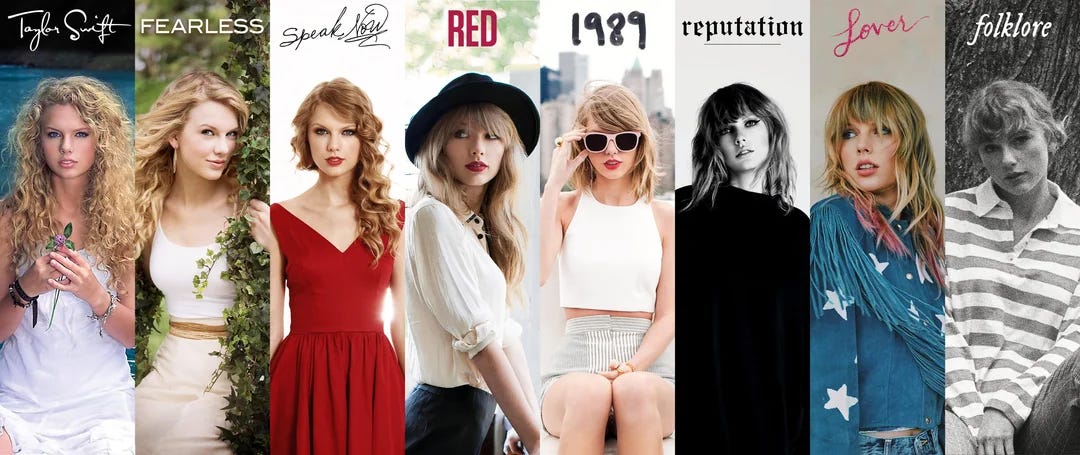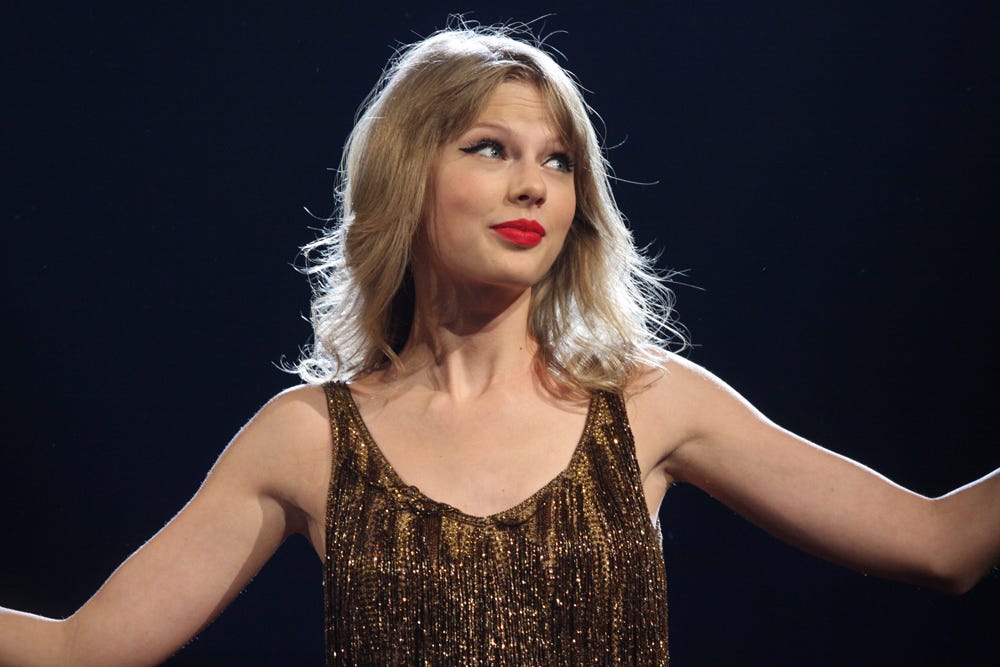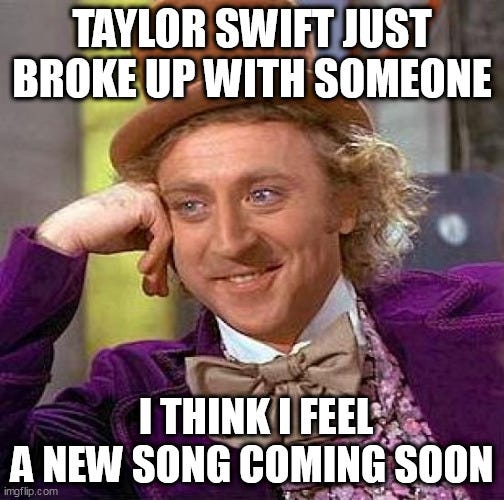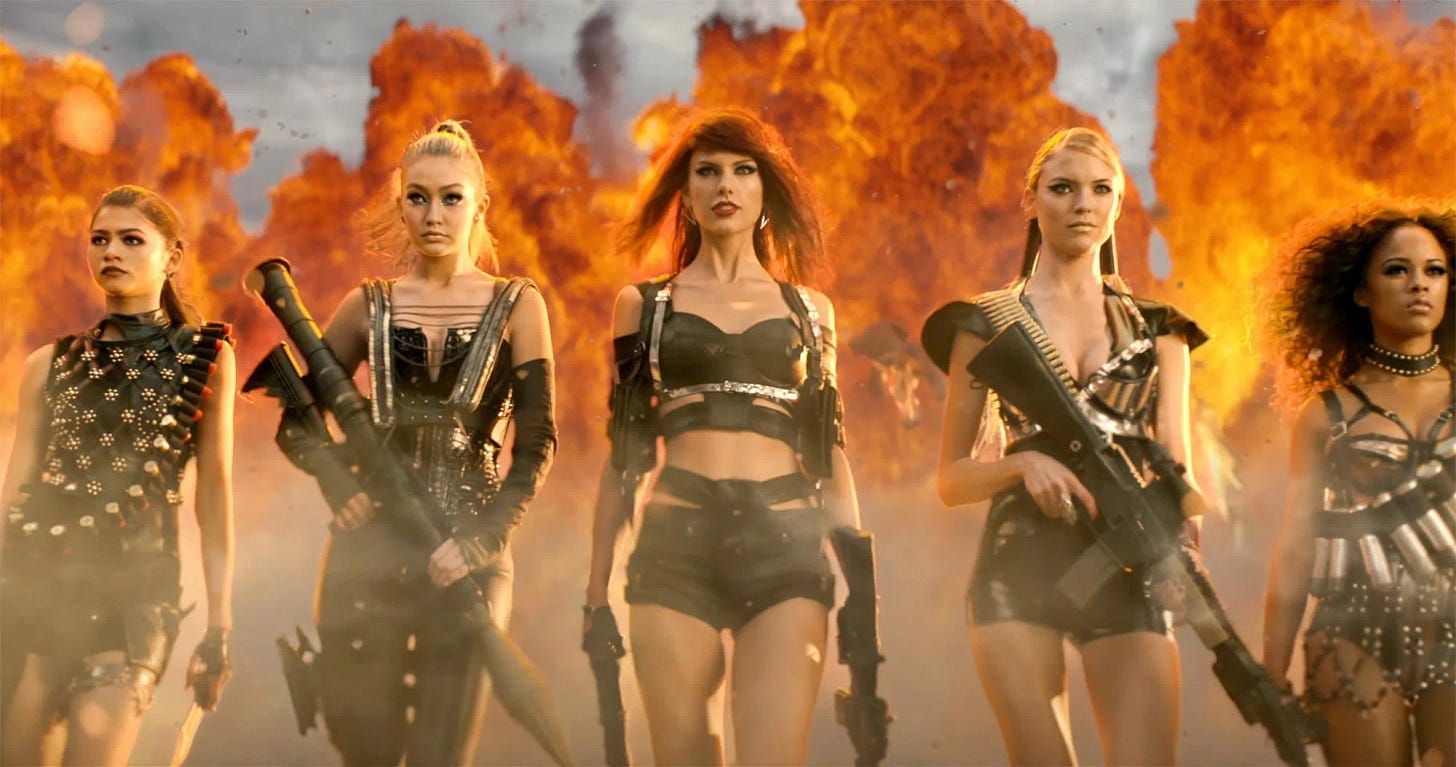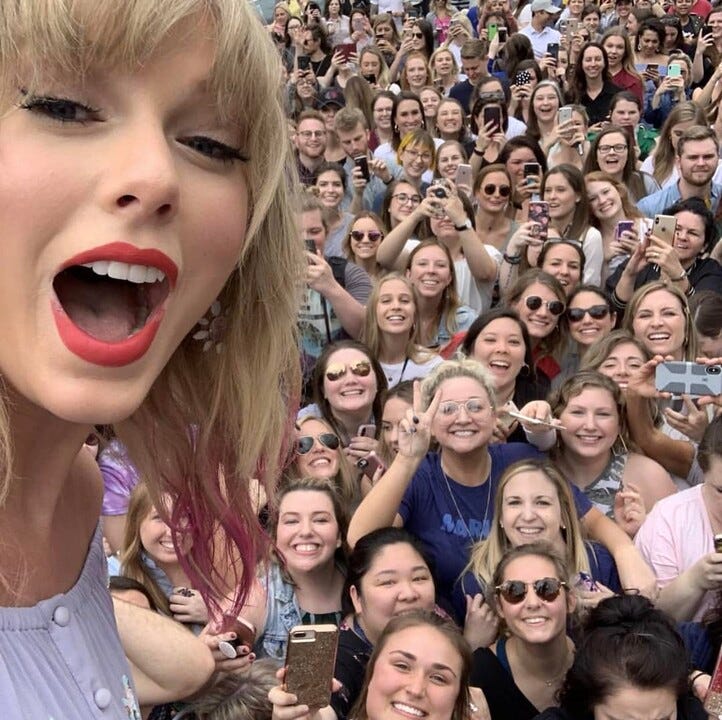Taylor Swift is a billionaire--yeah, "-illion" with a "B"
A "uh, how did this happen?" opinion piece by a person who doesn't know who this other person is
“Confession time!” *naughty finger in mouth*…
I don’t listen to Taylor Swift’s music. I kind of hear her music in the background a lot…like, it’s around, like in malls and stores…plus I hear the regular gossip of moms spending thousands of dollars to buy Eras tickets for their daughters…like…tens of thousands of dollars.
But I’m not someone who consciously, with purpose, downloads or streams or even stops-to-listen-to a Taylor Swift song.
So when I hear Taylor Swift is now a billionaire, it gives me pause: How? What? Why?! Whut?! How?!
Maybe it makes sense if one were to look at Taylor Swift less as an “artist”, and more like “Taylor Swift, Inc.” as a business.
So let’s take a look at how this “business” works.
The Preamble: Taylor Swift is “created” & “curated”
I’m gonna be a ‘lil “heat ‘n sweet” here: “Taylor Swift, Inc.” seems to be a curated creation.
She is both created—active work done to create her image—and she is curated—active work to select which media of her is pushed out, and which media of her is cut—a complete, edited work of real-fiction.
Even a very-cursory examination of Taylor Swift seems to show her as the output of a specific marketing computer program: every moment of her, every photo, every video, every appearance, social media post, plus business dealings, negotiations, etc.,
SCREAMS!
“curated creation”.
She is someone who has voluntarily and consciously and carefully created & curated an image of herself—her mother is coincidentally a former marketing executive—and rocket-shipped this image to the stars on the back of an elite financial acumen—whether from herself, or more likely, her father—a *stockbroker*—and his network.
It’s A “Well-Bought” Life: the Musical
Not to say Taylor Swift isn’t talented—she is.
I think however to say she’s talented brings into question what, exactly, “talent” means.
Usually “talent” means some innate, ineffable ability a person has that is not just good, but excellent at something…and not just excellent, but effortlessly excellent at something. And it is ineffable because if we knew how this person got so talented, it could be replicable. Talent, in other words, is god-like.
“Talent” thereby is inextricably linked to success: because the assumption is, if someone is effortlessly excellent at something, that means they are successful at it, and their success and excellence is recognized by all as being, indeed, excellent and successful.
However—what is excellence and success can be bought? What if (indeed!) there is a replicable formula to “talent”—and that formula has something to do with lots and lots of lettuce (cough!) money?
Because if there are aspects to talent that can be bought, then that would complicate our conception of what “talent” is, it kind of reduces the ineffability, the god-like part of it…y’know, it’s like lil’ Orphan Annie singing about a “hard-luck life”—played by a well-to-do rich girl, who’s hired the best and been trained by the best because she has the cash to do so. Is that really a hard-luck life?
Or “well-bought”?
🎶🎵 “It’s a well-bought life…for me! It’s a well-bought LIFE! FOR ME!” 🎶🎵
But the one key feature of Taylor Swift Inc.’s success is probably the most important: drive. There is no doubt that to achieve the levels of fame and wealth, Taylor Swift had to be, and is, ambitious.
Overall, from a media and cultural point of view: Taylor Swift is a good “inflection point” to study and see how “Taylor Swift” is a reflection of the cultural idiom we’re currently in.
We’re going to look at these major themes of the stories that buzz around Taylor Swift:
the allegations that she “self-inserts” herself into her songs, indeed cannot but help the self-insertion, namely that her songs are mostly about her, and about her ex-boyfriends, and/or “feuds” with fellow stars, and/or her ex-boyfriends who are also stars and she has feuds with them…basically feuds with stars. Note that there is never really reported feuds with people who aren’t stars…aka the “normies”…because when you think about it, their social media following isn’t that good? (There’s also stories of business tensions aka buying her own song masters back, but that’s a soap show for adults, and let’s face it, not the stuff of a song targeted at tween and teen girls—until it’s re-themed as girl power!).
her cultivation and usage of her massive social media fan base—the “Swifties”—in order to serve as a nuclear threat that can be implied—never vocally mentioned, but always hovering in the background, always just there—against anyone who may step out of line with a slight—perceived or real—against Taylor Swift. This weapon? tool? bludegon?! speaks overall to the marketing image and fan-following Taylor Swift has consciously created & curated.
Taylor Swift comes from a rich family, and rich families and entertainment I’ll touch on briefly because I want to explore a theory ‘bout money and entertainment in the modern age, especially the number of “billion” that’s continuously thrown around. When you unpeel open the banana a bit, one realizes that number is a valuation, it is not actual money. Has music reached a crossroads with the corporate mindset? Has it gone to the dark side? Is it all corporate? Is—*shock*—music dead?
The music she has made, and currently makes, and predictions of what music she will be making. This analysis will talk a little bit of music history and touch briefly on where Taylor Swift is in that spectrum—and how private equity is now valuing music, and how indeed, music has now become truly museum art—a collectible by the rich, for the rich.
Let’s get it on!
Before “Taylor Swift Inc.”
Cribbing from the numerous articles about the origin story of Taylor Swift, the short ‘n curlies read as such:
She grew up with a “love for music and a young dream of becoming a country musician” (even though she was born and grew up in Pennsylvania).
Her parents have her in singing lessons and theatre from a young age.
At 14, she convinces her parents to move to Nashville to be closer to the music scene there—signaling a desire that she’s putting all her chips into making music a career. How many 14 -year-olds know what they’re going to do for the rest of their lives? Jeez.
Once there, she gets hooked up with other songwriters and collaborators, gets her first record deal with “Big Machine Records” (a label her father also “invests” in), and through a steady extrapolated curve of created & curated exposure and business moves, Taylor Swift releases songs in the country music vein with a slight pop tinge. She gets some hits under her belt, powered by “catchy hooks and lyrics”.
Then she moves to New York, and completely morphs into a genre that I can only describe as “teen-adult pop electronica”. From there, her growth evolves into something that can only be described as an “international phenomena”, where tickets to her insane-in-demand live concert series “Eras” quickly sold out, and then got hyper-valued in the grey market as moms desperately sought the tickets for their daughters, and were willing to pay any price. (Anecodotally, I heard through our local grapevine that one mother sold her Taylor Swift tickets for $13,000. I think this article has massively downplayed how much the grey market was charging for Taylor Swift tickets).
Through all this, Taylor Swift dates a bevy of popular Hollywood actors and other “males of power”, right through to her current paramour, Travis Kelce, an NFL football star. Many of these relationships—actually, all her relationships—literally fuel her lyrics and songs.
In the last few years, Taylor becomes popular in supporting political causes and stating her own political beliefs, urging her fans to vote, and not only that, but to vote for the Democrats—namely Hillary and Kamala.
Also important to note: Taylor’s parents: father is a stockbroker, mother a marketing agent—have a huge influence on Taylor’s rise to the top. Numerous articles mention how Taylor’s parents—especially her mother—was constantly with her—writing sessions, photography sessions, da works. Her father was a minor investor in Big Machine Records, and it seems helped keep it afloat with his own investments as well as networking to get more investments to grow it.
“Outliers”—The Case for Taylor Swift
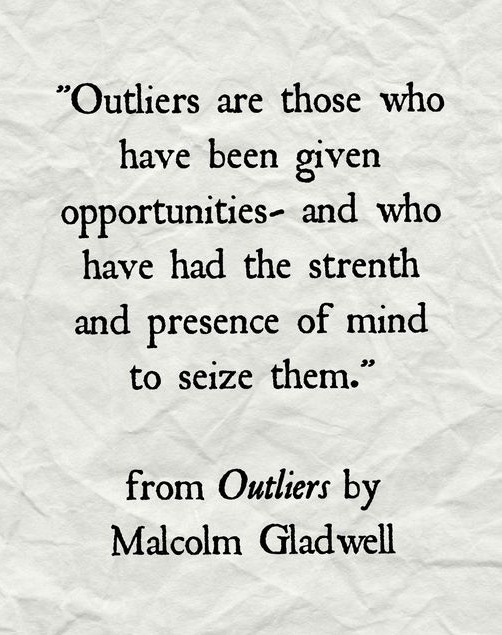
Taylor Swift has been given opportunities.
The first thing that pops out about Taylor Swift (her mom named her “Taylor” so she would have a non-genderized name, apparently to give her some kind of advantage?), is how much her parents “helped” her career. I finger-quoted “helped” because this isn’t the normal version of parental “help”, like when your mom bakes cookies for the school bake-sale, or your dad coaches the 12-and-under soccer team.
Nah—when one looks into the reports (and these are everywhere) it is very clear that Taylor’s parents not only “helped”, but changed their lives in order to achieve Taylor’s dream of pop stardom.
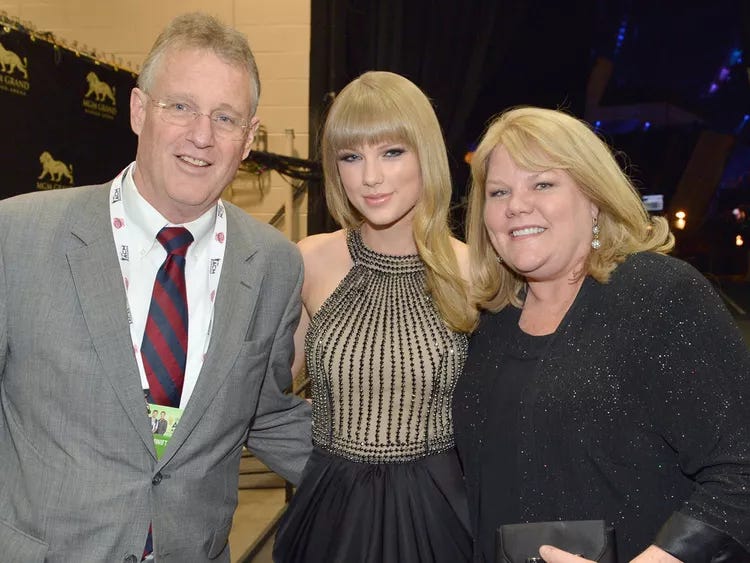
There is NO WAY that lower-to-middle-class parents of a similarly-talented child would have been able to uproot their lives and move to another city to support their 14-year-old kid with dreams of making it in music. Any low-to-middle class family would have found this hysterically unrealistic. This is a moon-shot route to success that was snow-plowed by determined parents.
This move by the Swifts smacks of Malcom Gladwell’s book Outliers, which argues that talented people get as far as they do not just by themselves, but with easy access to resources and/or historical circumstances that no one else has.
Is this wrong though? Absolutely not—we live in a democracy after all—but there’s a little unpleasant stink of “unfairness” wafting over all this, isn’t there? One cannot but help but think about all those creative geniuses, undiscovered, because they don’t have similar access to these same resources.
The famous blues guitarist Jeff Beck once relayed a story of recording at a studio in the 60’s in the southern US. After a recording session he left for a break. He came back when he heard someone playing blistering blues guitar licks in the studio. He entered the studio and stopped short, gobsmacked, as he discovered some young janitor who had picked up one of his guitars and was wailing away in such a demonstrative performance of virtuosic skill, that it threw Jeff Beck’s entire world view of his own talent out the window.
These types of arguments—or “what-coulda-beens” are similar to the stories of lost art, lost knowledge…like the destruction of the ancient Library of Alexandria.
How many super-talented and brilliant people, everything else being equal, get left behind because of the lack of the right assistance, in the right ways?
How many current artists got to where they are, playing with a stacked deck?
The music industry: the “algorithm” and the “new payola”
The above argument is not at all about proposing some kind of “one-size-fits-all” solution, aka, the solution to “inequity” is “equity”. There are tons of parents who try to snow-plow their kids’ careers and who are not successful.
However, there is a lot more going on here with Taylor Swift’s situation that seemed to contribute to her success than just helicopter parents.
There is also the institutional assistance doth given by the powers-that-be.
These institutions, such as Spotify, Google, and other massive digital companies who have taken over all kinds of media by being the sole, massive distributor of media—are playing an even larger part in valorizing one type of talent and suppressing other kinds of talent, and even in some cases—creating the talent: all per “algorithms”.
If an algorithm is pushing Taylor Swift’s songs in order for her songs to reach the widest possible audience possible, how many other songs that are perfectly valid, are being pushed out?
This situation isn’t about “making it on pure talent” anymore. It’s old-school payola, dressed in the Mafia-like dark suit of algorithms. The worst thing is that Spotify isn’t even using it’s own money to do this work—it’s using its own subscribers’.
Dovetailing with the ability of AI to potentially produce “hit” songs, the economics of music, already dead, is now re-animated and terrorizing everyone, zombie-like, with an increasingly-smaller funnel that pushes the smallest minority of music on everyone via algorithms and the monopoly of Big Tech.
How money is made: a pithy history
Money is made—indeed only exists—because of inefficiency.
Money is the middleman communication that says, “I have one thing that other people need, and other people have one thing I need, so let’s do an exchange”.
This lack is an inefficiency. If we were 100% efficient, we would have everything we would need ourselves to survive. But we don’t. So an inefficient system shores up the gaps with exchanges of goods and services (represented in a predictable holder of value called “money) so everyone gets what they need (in theory, of course).
We don’t need music to survive per se, but it is still something that people are willing to use the above system of economics to obtain.
So the question here is, where are the inefficiencies of the music industry, in the past, and today?
Making money in music comes from, including but not exclusively: media sales, concerts, apparel, and the support system that is tied into these industries (agents, retail stores, recording studios, performance venues, etc.)
Pre-internet, making music and distributing music was hard to do. Analog studio equipment was ancient and bulky and expensive (because it was inefficient), you could only record & distribute music by imprinting the music to a physical media device such as records, cassettes or cds, and these physical items had to be distributed physically (via delivery trucks and humans) to retail stores, which employed humans to unpack, stock, and sell these physical media—along with the physical media infrastructure created to play these devices (aka record players, tape players, cd players etc.).
Once the internet hit however, and digitization became a thing, the entire distribution model based on physical media collapsed. The distribution of music through digitization, was efficient—no more physical media needed, and no more retail stores required. (for the most part, external storage media such as thumb drives etc. notwithstanding). The actual steps required to get the music to the consumer were radically reduced. The result was there was no more profit incentive in the physical distribution of music (the ongoing existence and supposed niche popularity of records are being incentivized by purely different aesthetic reasons, and that’s a different—but still somewhat connected—argument).
The result? The inefficiencies of the music industry pooled towards the Big Tech companies who owned the infrastructure—morphed from physical media to digital media (the internet, the hardware storage, & the software applications, aka Spotify, and the “algorithms”)—and live concerts, which because the entire profit incentive in live concerts is tied in the “live” aspect, is protected and indeed siloed off from digitization.
Even the making of music became efficient: aka the digital song, made with digital music software like ProTools, Ableton Live, and the near-collapse of the “analog recording studio”; the swing away from “physical” instruments such as guitars, drums, bands, to synth keyboards and electronica songs and production; from individual songwriters to professional songwriters (many of whom are actually unprofitable—not necessarily untalented or “failed”—music performers themselves…and it is important to note that among several billion people on this plant, 1 person Max Martin wrote almost all of the uber hits we have heard or streamed in the last 30 years); and even potentially AI in the creation of lyrics and songs to the point of actual representation of human voices and ingenuity.
Another way of looking at it is that the music itself became the marketing tool for the artist—not the other way around. The value of the digitized music is not in itself being profitable, but only—and solely—in generating awareness and interest to those things that do create profit for the artists, such as apparel sales (coincidentally, not really conducive to digital copying), or driving consumers to purchase tickets to a live concert. For Big Tech, the music has value in them managing—and controlling—an ever-increasing vast library of “content” that only they can house & service, and which can be monetized through licensed subscriptions.
Overall, the “genuine” or “authentic”—or really the “inefficient”—links in the overall music industry chain have transitioned and pooled to whatever can’t be digitized—the live performance, the record, the cassette tape; and to those entities that govern the digitization, aka Big Tech.
Or another way of putting it: whomever or whatever governs the inefficient links of the chain, is making the cash. And in the vast majority—it is not the artist.
So…the question is, where in Taylor’s rise to pop stardom, did she utilize the “inefficiencies” of the chain to make her gazillions?
The inefficiency of Taylor Swift #1: social media savvy and too-personal lyrics selling celeb fake-intimacy
Another inefficiency-to-efficiency transformation happened with communication: the death of print media, to the rise and supremacy of digital media and more specifically, social media.
The rise in social media dove-tailed with a phenomenon both historical and yet oh-so-contemporary: the addiction of fans for a celeb writing his or her so-called “intimate” thoughts.
Heck, Lord Byron did it back in the day when he was writing poetry (we’re talking the 1800’s, when poetry was that time’s version of rap).
When social media first came online, the very first people to truly benefit from social media’s reach were celebrities.
All of a sudden, celebrities were given control over their own image. They didn’t need to rely on a perfectly-time papparazzi photo-op: they could be their own papparazzi. Indeed, the deluge of celebrity off-the-cuff musings, rando thoughts, embarrassing dances and impromptu karoake a capellas were so much more intrusive than ever People magazine could ever dream.
Taylor Swift’s use of social media plus the personal nature of her songs is what turns her cocaine into crack. And the personal nature—the oh-so-personal nature—of her songs—is something arguably not seen in pop stardom, based on the pure regularity of it (hey, if it works, why stop it?), combined with the almost gangsta-rap poeticity? of the lyrical stabs.
Overall: Taylor Swift’s use and indeed dominance over social media is unique in that her team uses it so effectively to butter-up and buttress her image. The value of this social media support probably can be represented with a dollar value, but really: it’s priceless.
Let’s now look at how Taylor Swift uses social media to give her marketing leverage and reach in the industry.
If you want to appear in a million-dolla song, simply “diss” Taylor Swift
Taylor Swift writing about you in one of her songs if you diss her is so common-place it has become meme-worthy. There’s lots of sites that cover more in-depth her “lyrical stabs” on other people that show up in her lyrics (try here, and here, and here), but the overall sense of it is—when you really step away and look at it objectively (I’m referring to you, Swifties!)—actually kind of…lame? Whiny…? Wack?
If shitting on your ex or other people who did you wrong through song is something considered a “valid” form of venting, what does that say about you as a mature person? Like, really? It’s on the level of throwing a child temper tantrum, pounding your little fists in the ground as you scream your head off.
Even moreso is Taylor Swift’s very obvious use of social media to curate and control her brand—and use it to control others as well.
My first reaction when I saw the publicity stunt surrounding Taylor Swift’s dating of Tom Hiddleston after a breakup with yet another dude was, “this seems like revenge”. It seemed very calculated: Taylor Swift dating Tom Hiddleston, a “hot” actor at the time…inviting all her “celeb friends” to her Hamptons mansion so they can take pics and post on social media—in similar white clothes (anyone think of yet another “celebrity” who did the same thing in the time realm of the 2000’s…?) and demonstrate, nay perform, support for Taylor like a gang would… (indeed, when there’s a lot of celebrities invited to an event, the implied question is who didn’t get invited, who was left out, who was excluded).
The “Swifties”
Indeed, the very existence of “Swifties” (the word denotes zombie-like fans, swirling hive-like to protect their Queen) not only embodies, it is—high-school politics.
The “Swifties” have a weight, a pressure in the market, to amplify, spread and hammer-home Taylor Swift’s messaging—and her alleged beefs. The non-questioning, every-loyal, vast-in-numbers “Swifties” serve as the tornado to super-fan the flames of drama from the ashes of inconsequential personal details—and all for an intended, very specific, very cruel and mean end, what females are well-known for: reputation damage.
No wonder one of Taylor Swift’s albums is named “Reputation”. Yes, it’s a commentary about Taylor Swift’s “own” reputation. But is it really? Which makes Taylor Swift’s song “Bad Blood” or “Look What You Made Me Do” even more interesting considering the same impetus is at work in those videos: an overt or implied hurt against Taylor Swift, images of her empowered and fighting back, and she’s justified in enacting her revenge…for what purpose? To re-attain her “reputation”? Or to…destroy someone else’s…? “Yass Queen!”
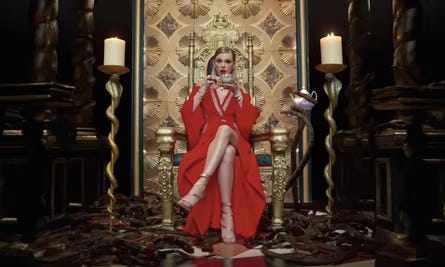
What’s the loop, what’s the pattern? Something negative is done to Taylor Swift…she writes a song about it…her curated list of “Swifties” analyse the song and connect it to the person who “harmed” Taylor Swift…there is then a pulsating, cyclonic negative reaction to that person via social media, pushed forth by Hurricane Swifties…print articles on the web pick up on this trend and amplify it…the hurricane begins to devastate Flori—er, the “victimizer”…and the “victimizer”—becomes the victimized.
What does this pattern overall say about Taylor Swift? Is she the victimized…? Or like any other bully, actually the villain?
It’s very possible both things can be true. But then again, as the saying goes, history is written by the winners…right?
Reputation is very much more of a white-collar concern than a blue-collar one…or more accurately, it takes on a higher priority. In a social setting where you’re not that concerned about where your next meal comes from, in the pyramid of needs, the next level on the pyramid is what your “social circle” thinks of you. Because a hierarchy needs to be established; power needs to be allotted accordingly to where you rank in this hierarchy; and hierarchy is based on the new currency: reputation.
Reputation in a nutshell, is the currency of your power: your ability to corral peoples’ attention to yourself, to have other people listen to you based on your “power”, to negotiate power over other humans, your ability to inflict on and take damage from, other people.
Taylor Swift’s real strength is in micro-targeting millions of suburban, middle-class, upper middle-class, and upper class women…because they see themselves in Taylor Swift. Taylor Swift is their mirror. Because…Taylor Swift is them. Is their? Is us? Something like that.
The inefficiency of Taylor Swift #2: A white chick’s lyrics and music holds up a rich suburban mirror
However, the other question as to how Taylor Swift was able to garner such a rabid fan base leads to precisely the perception of her lyrics and songs: Taylor Swift is writing from the heart…and what she writes, reflects millions of her fans’ lives. They see themselves in her. Isn’t that what being a true artist is all about, after all?
A “Swiftie” is not expecting Taylor Swift to write about a blue-collar life, like getting married, raising kids in her early twenties, working a dead-end job just to put food on the table…she’s not singing about any of those experiences.
Taylor Swift (and her songwriting/lyric team) instead writes about very personal stuff about her relationships, precisely because she can’t write about anything else with anything close to authenticity. She writes about the hard aspects of life in terms of relationships, but leaves the general day-to-day class struggles of being a poor blue-collar worker out of it. There’s no class struggles here. Because the journey of the middle-class'er and higher is about aspirational struggle—the better paying white-collar job, the most ideal mate to maybe have 1.5 kids with, that parallels—but doesn’t interrupt—a young fairly-well-off woman’s ideal life, career, and maybe child?-path.
Taylor Swift demo(graphic) is white, middle-class +plus female. There’s nothing wrong with that. But it’s just that. And judging from the cashola brought in from the Eras tour—does Taylor Swift Inc. need to market to other demographics? Not likely!
Taylor Swift Inc. music itself is very generic, lamestream, rock-polished pop, to be perfectly frank. There’s no rabidly off-notes here. Her big big hits, “You Belong With Me”, “Cruel Summer”, “Shake It Off” (arguably when she really hit the mainstream), “Blank Space”, “I Knew You Were Trouble”, “Look What You Made Me Do” (arguably only a hit because of massive marketing pressure showed just how intently Swift Inc. wanted this to be a hit), and “Wildest Dreams”, are all embodiments of the computerized, roboticized, output from a team of professional songwriters, lyricists and Taylor Swift Inc.’s business acumen to achieve one goal and one goal only: mainstream success. It’s a hard-bought life indeed…
Yes Taylor Swift Inc.’s commercial units are very well-written songs, but when you strip out the too-personal lyrics and Swift’s incredibly neutral voice—there is nothing really distinctive about her voice, indeed her voice is notably indistinctive…it’s the vocal equivalent of a palate cleanser—what is left of Taylor Swift Inc.?
This isn’t to say that there’s not a reason why Swifties LOVE Taylor Swift. Hey, I get it—she’s a mirror. It really hit home for me when I listened to “Anti-Hero”, which is arguably Taylor Swift’s most confessional song—indeed, the most diss-iest of disses, the meta of disses—a diss of herself—and I understood, nay FELT!—the success, the THWUNK! of a quivering arrow well-placed. It feels like the song is speaking to you, and you only…not only that, you are having a communication between yourself and someone who just gets you.
If every man is an island unto himself in this vast and unknowable universe, could it be that the thing that has most value—over air, water, and shelter—is just knowing there’s someone out there who sees you, by seeing himself (or herself in this case)…?
The bridge lyrics of this song are the most interesting of the song, no one really seems to understand what they’re about, but to me they make perfect sense in the context of the song and really just vault the overall messaging of the song if the main character is shitting all over herself:
I have this dream my daughter in-law kills me for the money
She thinks I left them in the will
The family gathers 'round and reads it and then someone screams out
"She's laughing up at us from hell"
It’s pretty straightforward: the daughter-in-law is Taylor' Swift’s fans (her “creations”, her “children or offspring”) and anyone else who thinks they “know” Taylor Swift outside of the absolute glut of media pics, videos, interviews that saturate current popular culture—crazily, insanely, all about one person. Is this not the modern misperception in the age of Big Data and the Internet, that the straight weight of DATA somehow equals knowing the soul? Truly a “God” argument can be made here as well…the worship of someone is not the worship of that person in and of herself, it’s the worship of a metonymy, a sliver, an idea of that person…isn’t that the most de-humanizing thing one person can do to another…? Does anyone truly know anyone else? Does Taylor Swift even know herself…?
Taylor Swift: you’re pretty funny. If you wrote those lyrics, that is…
………
The inefficiency of Taylor Swift #3: Popular music as museum art, by the rich, for the rich
Finally, let’s discuss exactly how Taylor Swift is a “billionaire”. Let’s actually break that down. Is she really?
The actual revenue from Taylor Swift’s Eras tour is estimated to be about 200 million. That’s a lot. But it’s not a billion.
The billion comes into play as a valuation of her music. Aka: the perception of what her music is worth.
But if music isn’t sold anymore as a physical medium…then where does the value of this music come from?
In modern times, if an insane amount of money is thrown around, it comes down to three things:
drugs (both legal and illegal, and usually involving some Crypto-Bro’ing, see below)
government siphoning and embezzlement of taxpayer money (what I term the “I drink your milkshake!” syndrome of modern governance)
stocks (the home of Crypto Bro the Original, Crypto Bro II, and Crypto Bro III: “The Spawn of Crypto Bro”)
Wall Street is a fictional figment, it creates wealth from nothing. That’s it. Someone on the digital world placeholder called “Wall Street” did an elementary-school paper fortune teller game and it spit out a valuation to Taylor Swift’s music, and voila! now she’s a billionaire.
Or, more likely, much like a piece of museum art, a bunch of millionaires and billionaires randomly selected a piece of “art” to want, and by that wanting, instantaneously gave it a value. It’s money laundering for the rich in other words.
Our economic system really does not serve the poors, huh?
Final thoughts: Taylor Swift Inc., just another (really big though) digital spider in the digital cobweb
The other day, I was driving my sister to an appointment. She asked me what I was up to. I mentioned I (of all people) was writing a piece on Taylor Swift, and started discussing what I was writing. I mentioned to my sister that Taylor Swift has a team of writers who write her songs for her, and it’s possible she writes very few, if none at all, of her songs.
My sister was non-plussed.
“That’s not true!” she replied loudly (or can one passively-scream?) at me. “Taylor Swift writes her own songs and that’s that!”
This is from a girl who doesn’t even listen to Taylor Swift. As far as I know…(how well do I know my sister anyway?) Sigh.
When people wonder where value comes from, and what it actually means, it stems from the above reaction: a belief, a want of something. Emotions that strong come from a belief that somehow, Taylor Swift has been elevated to God-mode for these women: she is a modern embodiment of worship.
However, that perception doesn’t dispute the fact that Taylor Swift is a creative curation—indeed, gods are created after all. She exists as the focal point in a cobweb of mythic value, woven by the spider of rich people, connected people, the priests & priestesses of Big Tech.
And we are the mere flies caught in that web.
-fin-



